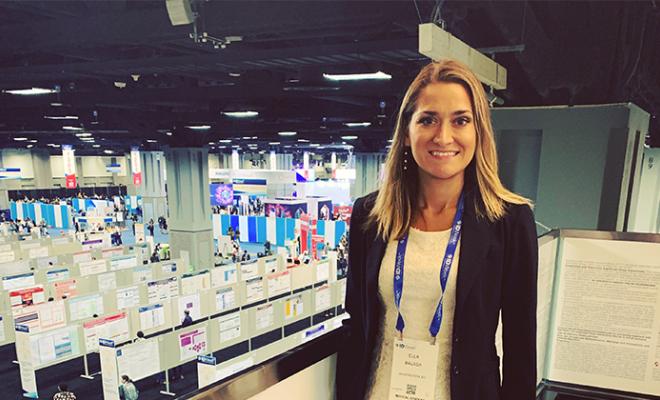Phage therapy has been a hot topic in the last few months in the cystic fibrosis community as the focus on alternate treatments to antibiotic-resistant bacteria is increasing in the CF population and worldwide. After my personal experience with phage therapy, I applied for and was accepted to be a CF community representative on the Cystic Fibrosis Foundation Infection Research Steering Committee. Ann Field, PhD, who leads the Foundation's Infection Research Initiative, sat down with me recently to discuss what the Foundation is doing regarding phage therapy research as a potential treatment option for CF infections in the future. Field is the senior director of drug discovery and development at the CF Foundation.
EB: Let's start by giving some background on what phage therapy is and how it differs from traditional antibiotics.
AF: Phages are specialized viruses that kill specific bacterial strains. They are found abundantly in the environment and are the natural predators of bacteria. They can be used to target specific hosts, such as certain strains of Pseudomonas and other disease-causing bacteria commonly found in CF lungs. Similar to antibiotics, they bind to bacteria, but unlike antibiotics -- which are small molecules that inhibit the bacteria replication or metabolism processes -- phages inject their own DNA into the bacteria, causing the bacteria to start replicating more phages inside of itself until the bacteria bursts and dies.
EB: This can be a positive aspect. As these bacteria are dying and releasing new phages, they spread to continue killing off more harmful bacteria. Unlike a virus -- like the cold or the flu -- that infects humans, phages attack only specific bacteria that they are programmed to attack and have been shown to be generally safe. Phage therapy is not a novel treatment. It was used decades ago and was largely abandoned in the West as antibiotics were developed and manufactured commercially with greater ease. And these aspects are also where some of the challenges with this therapy come into play.
AF: Exactly. First, phages may not remain potent for long periods of time to be stored on shelves of hospitals and pharmacies. And because of their specificity, it poses some difficulty with identifying and manufacturing a product for biopharmaceutical companies. Let's take Pseudomonas for example. Patients with CF have many different strains of this bacteria, and the challenge for developing a fixed phage cocktail for a broad population is that it might not be effective for everyone as people have different strain combinations within their lungs.
The most effective way to treat with phages may be to tailor the phage treatment cocktail to the bacteria that a specific person cultures, but this creates its own challenges when talking about large scale development of biopharmaceutical products. And lastly, bacteria do become resistant to phage, sometimes during a single course of treatment. Questions remain as to whether bacteria will be susceptible to phages that are used, and how fast could they become resistant to treatment.
EB: These are certainly unknowns and obstacles to the progression of phage therapy thus far into the pharmaceutical space, but there are possible avenues for circumventing some of these hurdles. Because phages have DNA, they can be genetically engineered to contain genes to be more potent against the bacteria providing some solutions to resistance. There is also some evidence in studies that show when bacteria develop these resistances to phage, they have to make tradeoffs and often give up their antibiotic resistance mechanisms in the process, making them more susceptible to antibiotics. Therefore, phage treatment simultaneous with antibiotics can be a compounded attack on bacteria. I actually experienced this during my own treatment with phages.
AF: Could you talk a little more about your experience? What was it like?
EB: I tried phage therapy at a time when I had been battling a severe exacerbation for over a month having been on IV colistin and meropenem, and I still had a lot of green mucus and needed supplemental oxygen constantly. I inhaled phages in normal saline once a day through a Pari nebulizer for one week. At first, I didn't feel a difference but after the week, I started clearing the bacteria faster than I have ever cleared an exacerbation before, and I had used this particular cocktail of antibiotics many times in the past. So, I know it was the addition of phages changing the sensitivities of the bacteria to the antibiotics, and within days I was coughing out brownish, dead bacteria from deep in my lungs.
After that treatment I did another round of phage about three months later and then remained exacerbation-free for about six months. For me, this is incredible as the last few years I have required almost constant antibiotics, either oral or IV.
I wrote an article for HuffPost about my experience in more detail for those interested. Since sharing my experience, I have connected with families of those that have pioneered phage treatment in CF, namely Mallory Smith's parents, and those with CF that have had phage therapy since hearing my own story. I'm thankful that I was given an opportunity to try this treatment. I really don't think I would have been able to fight off that particularly terrible infection without it.
AF: Thanks for sharing that, Ella. I think many people will be interested in hearing your perspective. This type of precision treatment using phage and antibiotics simultaneously, although it seems to be an effective strategy, requires great attention and resources to be able to culture bacterial samples throughout the progression of phage treatment and alter both antibiotic and phage selections as bacterial resistances change during treatment. There are also some unique challenges when it comes to treating people with CF who have chronic infections, some with decades of colonization. As you mention, you were able to keep infections at bay for a while, but this treatment won't kill all the bacteria in the lungs.
EB: I did get a lot of questions from people after the treatment asking if I had been eradicated of Pseudomonas and how much better was my lung function. Phage therapy is not a magic treatment that will all of a sudden kill all the bacteria in CF lungs and eliminate all future exacerbations. Ann, you can discuss this a bit further. And although phages didn't help to improve my lung function, I didn't necessarily expect them to. After all, they are killing the bacteria only and not rebuilding damaged lung tissue, and for someone with the extent of lung disease and damage I have, even when exacerbations are cleared, lung function doesn't increase much.
AF: The complexity of the bacterial communities in the lungs of those with CF makes eradication very difficult, as well as the issue of getting to all affected areas where a certain strain of a bacteria may be hiding. Even if one or two strains are targeted with phages, there are most likely others that will be unaffected. Additionally, getting treatments into deeper areas of the lung, especially in more diseased lungs, is a challenge.
EB: Now that we have talked about the positives and negatives of this treatment, I'd like to touch on a little bit of current research. I know there is a phage therapy for Pseudomonas in the development phase at a pharmaceutical company, but nearly all cases of treatment thus far have been on an individual compassionate-use basis. Does the CF Foundation plan to fund the development of phage clinical trials or preclinical research?
AF: The Foundation is actively working with companies and academic researchers capable of conducting controlled clinical studies to determine if phage therapy is safe and effective for people with CF. We are funding preclinical phage studies and hope to be funding clinical trials soon. One of the challenges with phage research has been the lack of rigorous clinical studies, and these will be necessary if phage are ever going to be approved by regulators, such as the FDA.
Even though it's not a new idea, phage have been used on a case-by-case basis, and it's difficult to extrapolate one person's experience to a larger population. I think the phage therapy field is at a tipping point with manufacturing and genetic technologies becoming sophisticated enough to understand the phage that are being given to make sure they are safe and better identify phage cocktails that may work. Several companies are starting clinical trials soon in other infections like urinary tract infection, and I think trials in CF infections will not be far behind. It's certainly an exciting field, and only time and rigorous science will tell if phage will be an effective new treatment in our arsenal to treat infection in people with CF.
EB: We hope this overview has been helpful for the community to understand more about phage therapy to debunk some misconceptions and provide new information about another possibility for infection management in the future.





